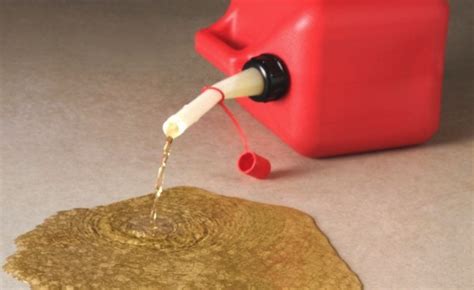Cleaning a Gas Spill in a Detached Garage: A Comprehensive Guide
A gas spill in your detached garage is a serious situation demanding immediate and careful action. Gasoline is highly flammable and its fumes can be lethal. This guide provides a step-by-step approach to cleaning up a gas spill safely and effectively, minimizing risk and ensuring environmental responsibility. Remember, safety is paramount; if you're unsure about any step, contact a professional hazmat cleanup service immediately.
What to Do Immediately After a Gas Spill
The first few minutes are critical. Your immediate actions can significantly impact the safety and efficiency of the cleanup.
- Evacuate and Ventilate: Get everyone, including pets, out of the garage and surrounding area immediately. Open all doors and windows to maximize ventilation. This reduces the concentration of flammable vapors.
- Turn Off Ignition Sources: Ensure all ignition sources – including pilot lights, electrical switches, and anything that could create a spark – are turned off. Do not use any electronic devices (phones included) near the spill.
- Call for Help (If Needed): If the spill is significant, involves a large quantity of gasoline, or you feel uncomfortable handling it yourself, call your local fire department or a professional hazmat cleanup service immediately. Don't hesitate; their expertise is invaluable in these situations.
How to Clean Up a Small Gas Spill
For minor spills, you can usually handle the cleanup yourself, but always prioritize safety.
- Absorb the Spill: Use absorbent materials like kitty litter, sand, or commercially available spill cleanup kits. These materials will soak up the gasoline, preventing it from spreading further. Avoid using cloth rags, as these can become saturated and difficult to dispose of safely.
- Contain the Spill: Create a containment area around the spill to prevent it from spreading to other parts of the garage. You can use absorbent pads or create a barrier with sand or kitty litter.
- Scoop Up the Absorbent Material: Once the gasoline is absorbed, carefully scoop up the absorbent material and place it in a sealed, airtight container. This container should be clearly labeled with the contents ("Gasoline-Soaked Absorbent Material").
- Dispose of Properly: Gasoline-soaked materials are hazardous waste and require special disposal. Contact your local waste management authority for information on proper disposal methods. Never throw these materials in the trash or down the drain.
- Clean the Affected Area: Once the absorbed material is removed, clean the affected area with a detergent solution. Rinse thoroughly with water. Make sure the area is completely dry before using the garage again.
What to Do With Larger Gas Spills?
Larger spills necessitate a different approach. Never attempt a large-scale cleanup yourself; the risks are too high.
- Immediate Evacuation: Get everyone out of the area immediately.
- Call Emergency Services: Contact your local fire department or a professional hazmat cleanup service immediately. Provide them with details about the spill, including the location, the estimated quantity of gasoline spilled, and any potential hazards.
- Follow Instructions: Follow the instructions of emergency personnel precisely. They will have the expertise and equipment to handle the situation safely and effectively.
What are the safety precautions when cleaning up a gas spill?
Safety is your top priority. Always remember:
- Ventilation is crucial: Ensure good ventilation to reduce the risk of inhalation of flammable fumes.
- Wear appropriate PPE: Use gloves, eye protection, and a respirator designed for handling volatile organic compounds.
- No smoking or open flames: Strictly prohibit smoking or any activity that could ignite the gasoline vapors.
- Avoid sparks: Keep all electrical equipment away from the spill area.
How do I dispose of gasoline-soaked absorbent materials?
Never put gasoline-soaked materials in the trash or down the drain. These are hazardous waste and must be disposed of according to local regulations. Contact your local waste management authority or a hazardous waste disposal facility for guidance.
Can I use household cleaning products to clean up a gas spill?
While household detergents can be used to clean the area after the gasoline has been absorbed, they are not effective in cleaning up the spill itself. Focus on absorption first, then cleaning.
This guide provides a general overview. Always prioritize safety and, if in doubt, contact professionals. The information here should not be considered a substitute for professional advice.

